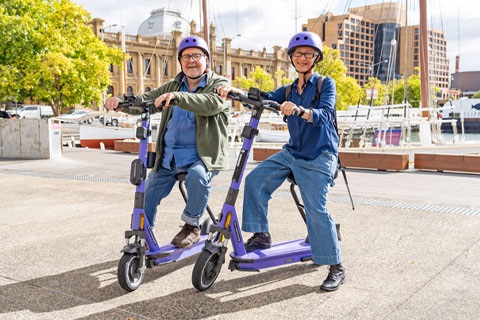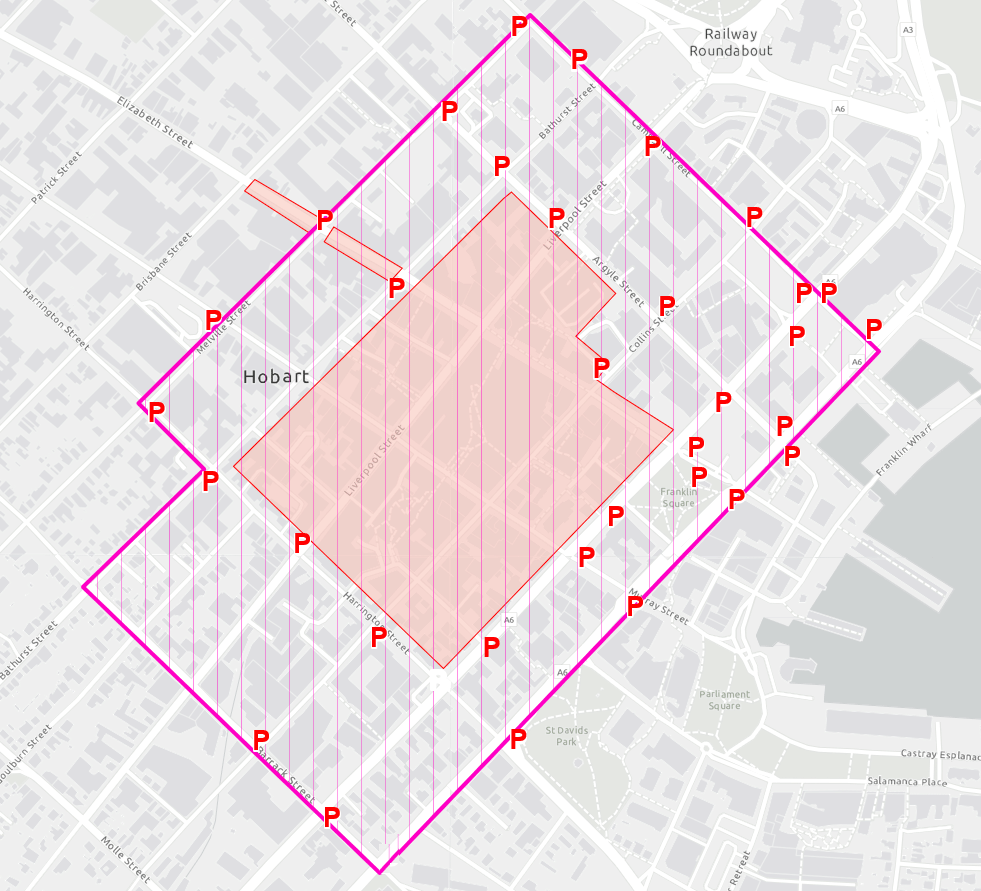Hire-and-ride e-scooters

The City of Hobart enables hire-and-ride e-scooter services to operate in the city.
The hire-and-ride e-scooters provide the community with a low cost, active transport option with regulated and insured devices.
Using hire-and-ride e-scooters
Beam Mobility (purple e-scooters) is currently permitted to provide hire-and-ride services in the City of Hobart.
To locate and use one of their e-scooters, download and sign up to Beam’s apps.
Travel zones
Under Tasmanian road rules e-scooters may be used on most footpaths, shared paths, bike lanes and roads with a speed limit under 50km/h.
Hire-and-ride e-scooters are subject to software-imposed speed limits, age limits, geofencing, compulsory helmet usage and other safety features.
Travel zones for hired e-scooters are enforced using in-built GPS locators and, in busy areas, must be parked in software-designated bays to reduce footpath clutter.
You can view the zones where the City has put restrictions in place for hire-and-ride e-scooter riders on the Travel Zone Map. Beam includes these zones in its app.
Hire-and-ride e-scooters will generally automatically slow down or stop when entering slow or no-ride zones. However, in some instances, geofencing accuracy can be delayed due to satellite drift. Beam's new safety technology, DROVER AI and Pedestrian Shield technology with onboard cameras and sensors will be able to provide more accurate geofencing responsiveness and improve community safety outcomes. Beam has committed to upgrading its fleet to 100% DROVER AI by the end of 2024.
When using a hire-and-ride e-scooter you must still keep watch for physical signage and follow directions to either move off the footpath and onto the road or from the road onto the footpath.
Travel zone map
Map legend
- Pink - No scooters or other personal mobility devices on footpath at signed times.
- Green - Preferred parking zones.
- Red - No parking area (outside of parking zones).
- Yellow - Excluded street as signed.
- Brown - Low speed zone.
For more information, click on the relevant zone on the map.
Beam may enforce extra no-go, no-parking, and go-slow areas that are not on this map.
A full-screen map can be viewed here.
Safety and behaviour
You must be 16 years or older and wearing a helmet to ride an e-scooter.
Before jumping on any e-scooter (privately owned or hire-and-ride) you must familiarise yourself with the Tasmanian Road Rules for personal mobility devices.
You must also read and follow Beam's rules before you start your ride. New riders must complete an online safety tutorial in the app.
The City of Hobart is actively engaged in promoting good rider behaviour and safety.
When using an e-scooter please remember that you share the space with other footpath users and must give way to pedestrians and people using mobility aids.
Hire-and-ride e-scooters are fitted with dangerous rider behaviour detection, which creates app-based rider alerts, fines, suspensions and customer bans to people doing the wrong thing.
To find out more about how to safely ride with others watch our Share the Space videos created with Guide Dogs Tas and VisAbility:
E-scooter videos
The City continues to work with Tasmania Police, the Tasmanian Government, Beam and other stakeholders to keep improving the use and safety features of hire-and-ride e-scooters.
Parking
Some designated parking bays have already been installed and have helped promote orderly parking in CBD areas.
More physical parking bays will be installed in high pedestrian areas, a map of these bays will soon be available on our website.
Under the new permit and single operator arrangements, restrictive parking trials will begin in the CBD and Battery Point in 2024.
Restrictive parking
Restrictive parking is designed to promote safe and orderly parking in physically designated bays. Restrictive parking is now live in Hobart in some high pedestrian areas such as the CBD.
Free floating (park scooter anywhere) parking will continue in the rest of the Hobart local government area, with operators continuing to educate riders to promote and incentivise safe and responsible parking.
So what is restrictive parking and how does it work?
The City in consultation with the e-scooter operator considered the most appropriate and safe places for designated parking bays.
Riders will be encouraged via incentives and discounts on their next trip to park in these designated bays.
Riders will be fined if they leave e-scooters outside of designated bays.
The City's data provider Ride Report will provide evidence if operators are not collecting e-scooters left outside of designated parking bays within an appropriate timeframe.
The new e-scooter permit enables the City to fine operators, if they are not keeping our streets tidy.

Key
 - Parking bay
- Parking bay
 - No parking area
- No parking area
 - No riding zone (between 8 am - 6 pm)
- No riding zone (between 8 am - 6 pm)
How to report an e-scooter issue
Beam is responsible for all aspects of its operations. Any issues can be reported directly 24 hours a day. Illegal or unsafe use can be reported to Tasmania Police.
The operator is also required to report all community concerns and messages to the City of Hobart monthly.
Beam Mobility (purple)
Report a Beam
Phone – 1300 507 676
Email – teamsupportau@ridebeam.com
Beam Mobility includes tactile instructions and a QR code on its Hobart e-scooter fleet to assist vision impaired citizens report fallen or mis-parked scooters.
Ride Report e-scooter dashboard
The City has partnered with Ride Report, a global micromobility platform manager, to enhance transparency and provide valuable insights and future transport data for urban planning.
The new public e-scooter dashboard enables everyone to see and use City of Hobart e-scooter data:
Ride Report dashboard